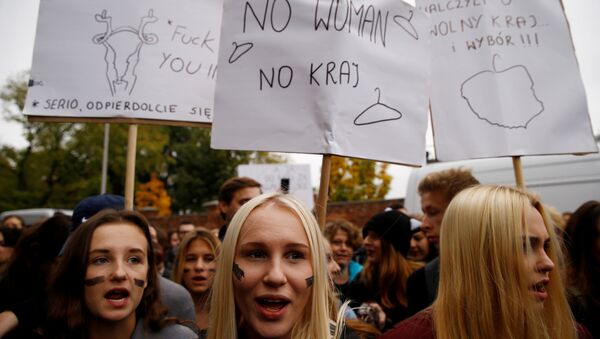Poland already has some of the most restrictive abortion laws in Europe, with the procedure only being legal in cases where the woman's life is in danger, where there is a risk of serious and irreversible damage to the fetus or where the pregnancy is the result of rape.
Though this exception is only valid with confirmation from a prosecutor.
MASSIVE turnout in Warsaw #CzarnyProtest via @PStrzalkowski https://t.co/kmUsb5dsAQ
— Exen (@Exen) October 3, 2016
But new laws could see the full criminalization of abortion. Many women's rights activists have expressed fears that this could result in women facing investigation if they miscarry.
Protests have taken place in London, Edinburgh, Brussels, and Berlin to name just a few, with some estimates suggesting that up to six million women could be taking part within Poland.
6 million women expected to be on strike in Poland today to protest dangerous new abortion law. #czarnyponiedziałek https://t.co/38WQ5GbaoM pic.twitter.com/COylKzC0w6
— Andrew Stroehlein (@astroehlein) October 3, 2016
Women in Poland, you're not alone!
— Thees (@theresakalmer) October 3, 2016
Hundreds are protesting alongside in Berlin at the moment.
(Via @aleksslota)#BlackMonday #CzarnyProtest pic.twitter.com/m9MUVoTHJJ
Basia Mindewicz took part in the protests in London.
"I wish I could be in Warsaw today. I think it is crucial to show the world what's happening in Poland. I hope that international solidarity will influence polish government but I think this is just a start. It won't be easy," she told Sputnik.
If someone from another country doesn't know why Polish women protests #blackprotest #CzarnyProtest pic.twitter.com/yKLm9fwWKZ
— Kath Morgenstern (@MagdaBazelewska) October 3, 2016
Anna Glogowska-Balcerzak from the Women's Rights Center Lodz told Sputnik that while current laws are so restrictive — the new laws have even wider consequences.
"They would also like to ban prenatal examinations offered to women, because if you cannot have an abortion — why would you need to have the examination to see if the baby is healthy?"
Today S&D MEPs wear black to mark #BlackMonday. We stand side-by-side with Polish women in defending their fundamental rights #CzarnyProtest pic.twitter.com/2qFgLL9PA0
— S&D Group (@TheProgressives) October 3, 2016
Forced Underground
Figures suggest that between 10,000 and up to 150,000 illegal abortions take place each year in Poland, compared to only one or two thousand legal abortions. This results in an increased risk for women who are "forced to go underground."
"We believe it is very dangerous, especially for those women who cannot afford to go to good clinics in Berlin or Prague, or elsewhere. Women who cannot afford that will be forced to go underground, and the conditions there are really risky for their health and lives. Even with the laws we have now, doctors are very reluctant to give permission to have an abortion, even in the case of rape. So you have the law, but it is very difficult to execute it," Glogowska-Balcerzak told Sputnik.
Miscarriages
But it is not just illegal abortions that could put women at risk of prosecution. Many activists are expressing concern that any woman who suffers from a miscarriage may be investigated.
"The women who miscarry will be suspected as they will never know if the miscarriage was natural or if she did something to terminate her pregnancy," Glogowska-Balcerzak told Sputnik.
"So as it is in other countries, like in some South American states, where there are similar laws, women are being prosecuted. There are investigations to see whether they tried to have an abortion at all. This is victimization, this is very serious trauma for them," she added.
At least 17 women are in prison in El Salvador under the country's abortion ban & criminalization of miscarriage. #Las17 @Unaflorporlas17
— Phil Neff (@cascadiasolid) March 30, 2016
The bill which would bring about the change in law is currently at the Committee stage in the Polish parliament, no government officials have yet commented on whether it will be revised.


